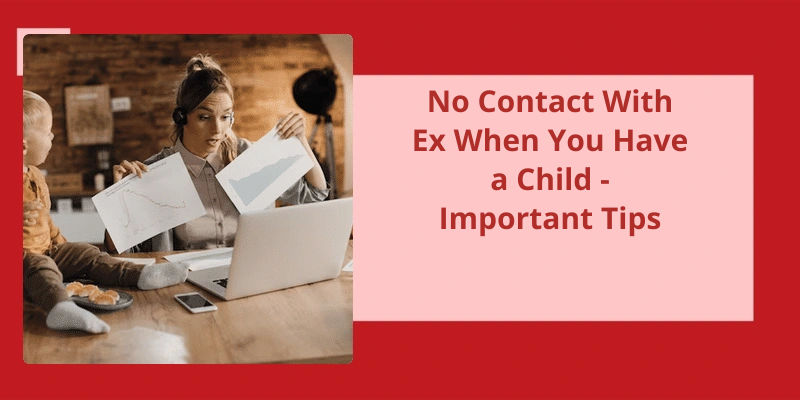Navigating a breakup can be difficult enough, but when children are involved, the situation becomes even more complicated. Many have turned to implementing the No Contact Rule, which entails cutting off all communication with an ex, to move on and heal. However, when you share children with your ex-partner, maintaining no contact can seem almost impossible. Despite the difficulty, it’s important to limit contact and communication solely to matters regarding the children to avoid any potential conflict or negative impact on the children's well-being. It can be challenging, but keeping things simple, polite, and focused on the children can make it easier to move forward and co-parent effectively.
What to Do When Your Ex Won’t Let You Talk to Your Child?
They can file a motion for a temporary custody order that will allow you to see your child until a permanent custody agreement is reached. In addition, they can help you gather evidence to support your case, such as text messages or emails where your ex denies you access to your child. Your attorney can also help you negotiate a parenting plan that outlines each parents responsibilities and access to the child. If you’ve already tried to communicate with your ex and have been unsuccessful, a lawyer can act as a mediator to facilitate communication and resolve any disputes.
Document Everything If your ex is denying you access to your child, it’s important to keep a record of all communication attempts. Save emails and text messages and make a note of any missed visits or phone calls. This documentation can be used as evidence in court to support your case. It’s also important to keep a record of any inappropriate behavior or neglect on the part of your ex that may endanger the child. Be sure to document any concerns you’ve about your childs wellbeing, including physical or emotional abuse, neglect, or exposure to dangerous situations.
Be Proactive In order to establish your parental rights, it’s important to take an active role in your childs life. Attend school events, extracurricular activities, and doctors appointments. Make sure you’re aware of your childs needs and communicate regularly with their teachers and caregivers. When possible, be flexible with your schedule to ensure that you can be available for your child when they need you. By being present and engaged in your childs life, you’re demonstrating your commitment to their wellbeing and establishing a foundation for a strong parent-child relationship.
Seek Support Going through a custody battle can be emotionally draining and stressful. It’s important to seek support from family, friends, and professionals. Consider attending therapy to help you cope with the challenges of the situation. Join a support group for parents going through similar situations. Talk to your family law attorney about resources that may be available to you, such as mediation or counseling services.
Remain Calm and Focused It’s easy to get emotional and lash out when you’re being denied access to your child. However, it’s important to remain calm and focused during this time. Avoid responding to your exs negative behavior with anger or aggression. Instead, focus on your goal of establishing a healthy relationship with your child. Be patient and willing to compromise where necessary, but also stand firm in your commitment to being a part of your childs life. With the help of a skilled attorney and your own determination, you can overcome the obstacle of an uncooperative ex and establish a strong relationship with your child.
When it comes to co-parenting, there are situations that arise that can be difficult to navigate. One such situation is when your ex introduces a new significant other into the picture. It’s natural to feel a sense of protectiveness over your children, but it’s important to understand the legalities involved in keeping your ex’s partner away from them. In this article, we’ll explore what you need to know about the topic, including your legal options and considerations.
Can I Keep My Ex’s Significant Other Away From My Kids?
Divorce can be a messy experience, especially when children are involved. One of the most complicated things to figure out is how to navigate the relationship between your children and your exs significant other. This is especially true if your relationship with your ex isn’t amicable. While it may be tempting to try to keep your exs significant other away from your children, it isn’t always possible, legally or emotionally.
This means that if you simply don’t like the person your ex is dating, you won’t be able to prevent them from being around your children. However, if you’ve evidence that they pose a direct threat to your childs safety, you may be able to obtain a court order preventing them from being around your children.
It’s important to remember that any interference into your exs personal life will be reflected in yours as well. If you try to interfere with your exs relationship with their significant other, they may retaliate by interfering with your relationship with your children. This can lead to a never-ending cycle of conflict that’s harmful to everyone involved. Instead, try to focus on creating a peaceful and harmonious co-parenting relationship with your ex, even if that means accepting their new partner.
If you’re concerned about your childs safety around your exs significant other, be sure to document any incidents or concerns you have. This can include direct observations, conversations with your child, or other evidence that demonstrates that the person is a danger to your childs well-being. You may also want to consult with a family law attorney who can advise you on your legal options.
Navigating a co-parenting relationship with an ex can be complex, especially when it comes to the involvement of new partners. It’s natural to have concerns about who’s spending time with your child, but what happens when your ex doesn’t approve of your new partner? Can they prevent them from being around your child? There are legal avenues to explore, but the answer isn’t always straightforward.
Can My Ex Stop My New Partner Being Around My Child?
However, if your exs new partner could pose a threat to your childs well-being, you may have grounds to take legal action. In some cases, a court may intervene to restrict access to your child. For example, if your exs new partner has a history of substance abuse or domestic violence, a court may order that they can’t be around your child. Similarly, if your exs new partner has a criminal record that suggests they could pose a threat, a court may intervene. Ultimately, the courts decision will be based on what’s in the best interests of your child.
Courts generally believe that children benefit from having more adults in their lives who care about them. However, if you’ve concerns about your childs safety and well-being, it’s important to speak up. You can raise your concerns with your ex, and if necessary, with a lawyer. A lawyer can help you understand your legal rights and the options available to you.
You may need to provide evidence to support your case, such as police reports, medical records, or witness statements. You may also need to attend court hearings and work with a lawyer to prepare your case.
Regardless of whether you choose to pursue legal action, it’s important to prioritize your childs well-being. This means focusing on providing a safe and stable home environment, and ensuring that they’ve access to the resources they need to thrive. It also means being able to co-parent effectively with your ex, even if you don’t always agree on everything. By putting your childs needs first, you can help them grow and develop into happy, healthy adults.
How to Effectively Co-Parent With an Ex-Partner Who Has a New Partner Involved in the Child’s Life.
Maintain clear communication, establish boundaries, and prioritize the child’s best interests when co-parenting with an ex-partner who’s a new partner involved in the child’s life. Focus on being respectful and supportive of each other’s roles in the child’s life, and avoid any conflicts or negative interactions in front of the child. It’s important to be flexible and compromise when necessary to create a healthy and stable environment for the child.
Source: Can I Control Whether My Ex’s Significant Other Sees My Kids?
Dealing with a situation where a former spouse keeps a child away from their parent can be a tough and emotionally charged issue to handle. When negotiation and communication fail, other options must be explored. In many cases, it’s essential to seek legal assistance to ensure that child custody rights are protected. There are various steps that can be taken to resolve the issue, including filing a motion for contempt, consulting with a lawyer, or contacting the police. In this article, we will explore some of the most common options available to parents struggling with this issue.
What to Do When Your Ex Keeps Your Child From You?
One of the most difficult things a parent can face is being separated from their child, especially when it’s due to an ex-spouse keeping the child from them. There can be many reasons why an ex might behave in this way, but regardless of the root cause, it can feel like an impossible situation to deal with. However, there are steps that can be taken to resolve the situation and ensure that a parent is able to see their child again.
The first step that parents should take when dealing with an ex who’s keeping their child from them is to attempt to open lines of communication. Even if things ended badly between the two parties, it’s important to put those feelings aside and try to have a civil conversation about the situation. Parents should express their desire to see their child and try to identify the underlying issue behind why the ex is preventing them from doing so.
If communication fails, then the next step is to consider private child custody mediation. This will involve both parties sitting down with a neutral third party, such as a mediator or counselor, to work through their issues and hopefully come to a resolution. Mediation can be a much more effective way to resolve disputes in a calm and amicable fashion, as opposed to going through the court system.
If mediation is unsuccessful, then the parent who’s being kept from their child may need to file a motion for contempt with the court. This is a legal document that will request that the ex be held in contempt for violating an existing custody order. While this is a more aggressive route, it can be effective in getting the ex to comply with the terms of the custody arrangement.
In some cases, it may be necessary to consult with a lawyer as well. A good family law attorney will be able to advise their client on the best course of action to take, based on the specifics of the situation. They can also provide guidance on legal strategies and represent their client in court if necessary.
If all else fails, then the parent may need to contact the police and file criminal charges against their ex for custodial interference. This is a serious crime that can result in jail time for the offending party, but it should only be pursued as a last resort.
Unfortunately, all of these legal options come with legal expenses that can quickly add up. However, parents should know that there are options available to them for saving money on legal fees. One option is to use unbundled legal services, where a parent pays for only the specific legal help they need, rather than hiring an attorney to handle everything.
It’s essential for parents to keep their focus on their child. While it can be incredibly frustrating and emotional to be kept away from ones child, it’s important to keep a level head and explore all options for resolving the situation. With persistence and the right approach, a parent can regain access to their child and ensure that their bond remains strong.
Tips for Co-Parenting With an Uncooperative Ex-Spouse
Co-parenting with an uncooperative ex-spouse can be challenging, but there are tips to make it easier. Communication is key, so remain calm and respectful even when it’s difficult. Focus on the needs of the children and prioritize their well-being. Establish clear boundaries and stick to them. Seek out support from a therapist or counselor if necessary. Remember that co-parenting takes time and effort, but it’s ultimately in the best interest of your children.
When it comes to co-parenting, questions about parenting responsibilities and rights can be challenging to navigate. A common query among co-parents is who’s the final say on decisions about child-rearing. In this article, we will go over the nuances of whether your ex can tell you who can watch your child.
Can My Ex Tell Me Who Can Watch My Child?
However, if you’ve a custody agreement or court order in place, there may be restrictions on who can be around your child during your exs parenting time. For example, if there’s a protective order in place, your ex may not be able to allow certain people to be around your child, even during their parenting time.
If you’ve a good co-parenting relationship, you may be able to work together to come up with a solution that works for everyone involved. If not, you may need to seek the assistance of a mediator or family law attorney to help you navigate these issues.
This can be a complex and time-consuming process, but it may be necessary in order to protect the safety and well-being of your child.
Ultimately, it’s important to remember that your childs best interests should always be the top priority. With open communication and a willingness to work together, you can ensure that your child is able to thrive, even in the midst of a custody dispute.
How to Create a Parenting Plan That Addresses Custody Issues
To create a parenting plan that addresses custody issues, parents should communicate effectively and focus on the best interests of their children. They should consider factors such as each parent’s work schedule, the children’s school schedules and extracurricular activities, and any special needs of the children. The plan should also include specifics on how the parents will make decisions regarding the children’s upbringing, such as medical care and education. It’s advisable to seek the help of a mediator or a family law attorney to navigate the legal aspects of the parenting plan.
Conclusion
It’s important to remember that the No Contact Rule isn’t meant to be a punishment or a way to isolate yourself from your ex, but rather a tool to help you move on and heal from the breakup. By focusing on your children and keeping communication to a minimum, you can create a healthy co-parenting relationship with your ex while also giving yourself space and time to heal. It may not always be easy, but maintaining a respectful and child-focused approach can ultimately lead to a happier and more peaceful future for all involved.






